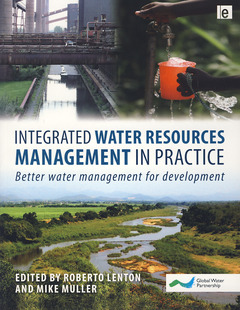Integrated Water Resources Management in Practice Better Water Management for Development
Coordonnateurs : Lenton Roberto, Muller Mike

Better water management will be crucial if we are to meet many of the key challenges of this century - feeding the world's growing population and reducing poverty, meeting water and sanitation needs, protecting vital ecosystems, all while adapting to climate change. The approach known as Integrated Water Resources Management (IWRM) is widely recognized as the best way forward, but is poorly understood, even within the water sector. Since a core IWRM principle is that good water management must involve the water users, the understanding and involvement of other sectors is critical for success. There is thus an urgent need for practical guidance, for both water and development professionals, based on real world examples, rather than theoretical constructs. That is what this book provides.
Using case studies, the book illustrates how better water management, guided by the IWRM approach, has helped to meet a wide range of sustainable development goals. It does this by considering practical examples, looking at how IWRM has contributed, at different scales, from very local, village-level experiences to reforms at national level and beyond to cases involving trans-boundary river basins. Using these on-the-ground experiences, from both developed and developing countries in five continents, the book provides candid and practical lessons for policy-makers, donors, and water and development practitioners worldwide, looking at how IWRM principles were applied, what worked, and, equally important, what didn't work, and why.
Published with the Global Water Partnership
Foreword. Preface. 1. Introduction. Part I: Local Level. 2. A Watershed in Watershed Management: The Sukhomajri Experience. 3. A Tale of Two Cities: Meeting Urban Water Demands through Sustainable Groundwater Management. 4. Wetlands in Crisis: Improving Bangladesh's Wetland Ecosystems and Livelihoods of the Poor who Depend on them. 5. Should Salmon Roam Free? Dam Removal on the Lower Snake River. 6. Better Rural Livelihoods through Improved Irrigation Management: Office du Niger (Mali). 7. From Water to Wine: Maximizing the Productivity of Water Use in Agriculture while Ensuring Sustainability. Part 2: Basin Level. 8. Turning Water Stress into Water Management Success: Experiences in the Lerma-Chapala River Basin. 9. Turning Conflict into Opportunities: The Case of Lake Biwa, Japan. 10. Taming the Yangtze River by Enforcing Infrastructure Development under IWRM. Part 3: National Level. 11. Taking it One Step at a Time: Chile's Sequential, Adaptive Approach to Achieving the Three Es. 12. Attempting to Do it All: How a New South Africa has Harnessed Water to Address its Development Challenges. Part 4: Transnational Level. 13. Transboundary Cooperation in Action for IntegratedWater Resources Management and Development in the Lower Mekong Basin. 14. Conclusions: Lessons Learned and Final Reflections. Index
Roberto Lenton is Chair of the Technical Committee of the Global Water Partnership. He is former Director of the Sustainable Energy and Environment Division of the UNDP in New York and Director General of the International Water Management Institute, Sri Lanka.
Mike Muller was Director General of South Africa's Department of Water Affairs and Forestry and is currently visiting professor at the University of the Witwatersrand's Graduate School of Public and Development Management.
Chapter contributors include a number of other practitioners, such as Humberto Pena who led Chile's sector reforms and Akissa Bahri, currently director of IWMI in Africa, as well as experts from NGOs or with professional and academic backgrounds, including Peter Rogers from Harvard University and Judith Rees of the London School of Economics.
Date de parution : 03-2009
Ouvrage de 228 p.
18.9x24.6 cm
Date de parution : 03-2009
Ouvrage de 288 p.
18.9x24.6 cm
Thèmes d’Integrated Water Resources Management in Practice :
Mots-clés :
approach; office; niger; lake; biwa; snake; river; rights; murray; darling; Ta Ge; Pe Rc; Office Du Niger; IWRM Approach; Harmonious Society; Yangtze River; Yangtze; IWRM Principle; IWRM; Public Administration; Lake Chapala; Water Resource Management; Central Government; Lao PDR; Mekong Agreement; LMB; Lake Biwa; Murray Darling Basin; IWRM Implementation; Mekong Committee; Tonle Sap Great Lake; LMB Country; Tonle Sap; Sea Water; Adaptive Water Management



